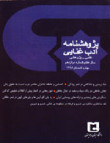Comparing some examples of practical wisdom in Divan and Hadighe Sanai and Masnavi Molavi
According to Dehkhoda dictionary, “Hekmat” means knowledge, insight and cognition, and a person is called a sage who has mastered the knowledge and information of his day, and idiomatically it means philosophy and mysticism, and that is knowing what a perfect human being must be.Most ethicists have considered two branches for wisdom, namely theoretical wisdom and practical wisdom. According to Aristotle: Practical wisdom means that we are aware of the duties and responsibilities of human. It means that we pay attention to our duties and responsibilities from the point of view of reason and intellect. Practical wisdom deals with the power of reason and the power of will and is limited to human. Practical wisdom is a set of do's and don'ts. Do's and don'ts are also related to human beings, which are divided into two categories: 1. They are personal; This means that one should observe the do's and don'tsabout oneself or it is related to society, which is of two types: 1- The science of housekeeping related to small community (family) 2- Civil policy (related to large community or country)According to Avecina, the purpose of theoretical wisdom is to perfect the power of thought and thinking and the ability to reflect on the facts and discover them, so that the level of actual intellect is realized for the soul. In such a way that perceptions and affirmations are obtained about involuntary matters, that is, matters whose nature is not our voluntary actions. While the first goal of practical wisdom is to perfect the power of thought and thinking by obtaining ideas and affirmations about human voluntary actions. But the secondary and ultimate goal of practical wisdom is the perfection of practical power due to a series of moral properties.Nasir al-Din al-Tusi, in the introduction to Nasirean Ethics, considers wisdom as the knowledge of knowing things as they are and rising to do things as it should be referred to as much as one can until the soul reaches the perfection it realizes. He calls the kind of knowledge and wisdom that is the perception of the truths of beings and the acknowledgment of its rules and entitlements as much as human power, the existence of which does not depend on human will, and like Farabi, enumerates the three main divisions for it and also deals with the details of science.He considers practical wisdom: "Knowing the interests of the deeds and artificial actions of the human species in a way that is beneficial to their living system and appropriate to achieve perfection."The works of Sanai and Rumi as two important judgmental-ethical sources, have the capacity and ability of research and judgmental research compared to our other literary works. Accordingly, in the present article, while compiling the necessary preliminaries of wisdom and ethics, the authors have sought to answer these questions: 1- On what basis was the ethical system of each of the mystical poets? 2- What is the place of practical wisdom in Hadith and Masnavi? 3- Are the designs of these humanizing ethical categories in the poems of these two poets exactly the same?
Comparative analysis method and library tools have been used to study the subject of practical wisdom in Hadiqa of Sanai and Masnavi Manavi.
The new method of teaching ethical issues and its literary expression in Sana'i works, especially Hadiqah al-Haqiqah [The Walled Garden of Truth], shows their high value in the method of expressing practical wisdom in simple language. Practical wisdom is a set of tasks existence of which depends on human possession and knowing the interests of the voluntary movements and artificial actions of the human species to achieve perfection. Practical wisdom is divided into three sections: ethical refinement, housekeeping, and civil policy, which are rooted in the views of Aristotle and Islamic scholars. Ethics is a branch of practical wisdom, and the purpose of this science is to know the virtues and vices that can be acquired through voluntary actions for human beings.Rumi's Masnavi, as an ethical-mystical work, has the ability to extract a special ethical system. In the subject of ethics and practical wisdom, Rumi's Masnavi has a prominent position and the enthusiasts of this valuable work, in addition to enjoying art, also benefit from its excellent teachings. Rumi's wisdom is a divine wisdom in which human can attain true knowledge. Given the value and position of practical wisdom in the upbringing, guidance and perfection of human, the mystic and wise poet like Rumi uses wise and parable themes masterfully and in the most beautiful way possible in Masnavi, and with the inspiration and establishment of religious sources, such as the Holy Quran and the words of the Infallibles (AS), he seeks to works on the advice of the people and the growth of their human dignity. Rumi often takes his preconceptions from mysticism. He believes that there is an inseparable link between mysticism and the understanding of religious wisdom.
Mystical and wise poets such as Rumi and Sanai, use wise and proverb themes in their works masterfully and in the most beautiful way possible, and inspired by religious sources, such as the Holy Quran and the words of the Infallibles (AS), they seek to advise the people and nurture and promote their human dignity in this privileged way.A comparative study of four examples of practical wisdom in the works of Sanai and Masnavi of Rumi shows that Sanai and Rumi, both in expressing theological and ethical teachings, have been influenced by Sharia and mysticism. The difference is that the ethical points in the Divan of Sanai have been used in panegyrics, and it is one of the praiseworthy ethical virtues, and there is a lot of exaggeration in them. Therefore, they may not be mentioned for their instructive aspect and positive impact on the audience, especially today’s audience. But in Hadiqa and Masnavi, which are two purely mystical works, the approach is spiritual and all ethical virtues find meaning in the direction of spiritual excellence, perfection, closeness, disappearance and annihilation. The wisdom of both mystic poets is wise, divine and Qur'anic, although they may have a glimpse of neo-platonic wisdom. Examples of practical wisdom in Sanai's works are more evident in the behavior of different sections of society, from judges to lawyers, ministers and kings, and sometimes in the biographies of religious leaders, and have more material and earthly aspects, but these in Masnavi can also have material and spiritual aspects, in Rumi's view, as much as he is the commander of the army of a brave king, harmless mystics such as Daqouqi, Shebli, and Junaid can also be brave and heroic in the privacy of their dervishes.In many of Hakim Sanai's advices and praises in Divan and Hadiqah, the purpose is to be close to the center of power and receive rewards and sometimes to promote the policy of reforming, educating and spreading ethics, but Rumi is a mystic who avoids the core of force and is dissatisfied with praise and flattery. And his ethical advice is based on Quranic and prophetic ethics.
Sanaei , Molana , morality , practical wisdom
- حق عضویت دریافتی صرف حمایت از نشریات عضو و نگهداری، تکمیل و توسعه مگیران میشود.
- پرداخت حق اشتراک و دانلود مقالات اجازه بازنشر آن در سایر رسانههای چاپی و دیجیتال را به کاربر نمیدهد.



